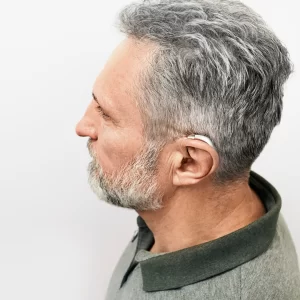Did you know hearing loss and dementia are linked? This surprising connection is gaining attention in the scientific community. Research suggests a clear link between hearing problems and dementia risk. According to a 2020 Lancet Commission report, hearing loss is a top risk factor for dementia. If you have hearing loss, your chances of developing dementia increase significantly. Let’s explore the latest findings and discover ways to reduce dementia risk through treating hearing loss.
Hearing Problems and Dementia: A Growing Body of Evidence
Studies reveal a significant connection between hearing loss and dementia. Research shows that untreated hearing loss can increase dementia risk. Notably, people with hearing loss who don’t use hearing aids are at a higher risk.
Key Findings
Here are the crucial points from the latest study:
- Increased Risk: Individuals with untreated hearing loss are significantly more likely to develop dementia. This risk can double or even triple, depending on the severity.
- Brain Strain: Hearing loss makes the brain work harder to understand sounds, impacting memory and overall brain function.
- Social Isolation: Hearing loss can lead to social withdrawal. Reduced social interaction is a known risk factor for dementia.
- Brain Atrophy: Untreated hearing loss may accelerate brain shrinkage in areas crucial for memory and cognition.
The Silent Threat: How Untreated Hearing Loss Fuels Cognitive Decline
Leaving hearing loss untreated can have significant consequences for cognitive health. Here’s how:
- Constant Effort: The brain works overtime to process sound, leaving less cognitive reserve for other functions like memory and focus.
- Sensory Deprivation: Untreated hearing loss reduces auditory input, potentially leading to cognitive decline by limiting brain stimulation.
- Communication Breakdown: Communication difficulties can cause frustration and social isolation, negatively impacting brain health.
- Stress and Depression: Challenges associated with hearing loss can increase stress and depression, both linked to a higher risk of dementia.
Discover more about the types of hearing loss.
Demystifying Dementia: Understanding the Types and Risk Factors
Dementia is a decline in cognitive function that interferes with daily life. Here are common types and their risk factors:
- Alzheimer’s Disease: The most common form, marked by memory loss and confusion.
- Vascular Dementia: Caused by brain blood vessel damage, leading to cognitive and movement problems.
- Lewy Body Dementia: Characterized by abnormal protein deposits, it causes hallucinations and cognitive decline.
- Risk Factors for Dementia
- Age: The risk increases with age.
- Family History: Having a relative with dementia raises your risk.
- Genetics: Certain genes may increase susceptibility.
- Cardiovascular Disease: Poor heart health is a risk factor.
- Diabetes: Uncontrolled diabetes can contribute to cognitive decline.
The Good News
Addressing hearing loss can help mitigate these risks. Studies suggest that using hearing aids can improve cognitive function and potentially reduce the risk of dementia.
Understanding the link between hearing loss and dementia empowers you to take proactive steps. Early detection and treatment of hearing loss, combined with a healthy lifestyle, can help reduce your risk of cognitive decline.
Find out more about buying hearing aids online.
The Domino Effect: How Hearing Loss Impacts Communication and Socialization
Hearing loss can trigger a cascade of negative consequences, leading to social isolation, a known risk factor for dementia.
The Struggles of Communication
- Missed Cues: Hearing loss can cause you to miss subtle cues, such as changes in tone or soft-spoken voices, leading to misunderstandings and frustration.
- Strained Interactions: Constantly straining to hear can be exhausting, making you withdraw from social situations.
- Feeling Left Out: Group conversations become challenging, leading to feelings of isolation and exclusion.
The Isolation Trap
Communication difficulties can make social interactions less frequent and enjoyable, triggering a downward spiral:
- Reduced Socialization: Fewer social interactions mean less stimulation for your brain, which is crucial for cognitive health.
- Increased Loneliness: Social isolation can lead to loneliness and depression, both risk factors for dementia.
- Loss of Confidence: Struggles with communication can reduce confidence in social settings, furthering the isolation cycle.
Breaking the Cycle
You can break this cycle and improve your social engagement. Here’s how:
- Treat Your Hearing Loss: Use hearing aids to improve communication and social interactions.
- Be Open with Friends and Family: Inform them about your hearing loss, ask them to speak clearly, and face you directly.
- Seek Supportive Environments: Join social groups or activities designed for people with hearing loss where communication is easier.
- Stay Connected: Maintain connections with friends and family through phone calls or video chats.
Taking proactive steps to address hearing loss and maintain social connections can reduce the risk of social isolation. A healthy social life is vital for maintaining brain function and overall well-being.
The Gift of Connection: How Treating Your Hearing Loss Can Benefit Your Relationships
Human connection is a fundamental need; untreated hearing loss can disrupt these connections. The benefits of treating your hearing loss go beyond just hearing better. Addressing hearing problems can also reduce your risk of dementia, making the “gift of connection” even more valuable.
The Strain on Relationships and the Link to Dementia
Untreated hearing loss can lead to:
- Misunderstandings and Frustration: Communication breakdowns can strain relationships.
- Social Withdrawal: The effort required to hear can lead to isolation, a risk factor for dementia.
- Feeling Left Out: Exclusion from conversations can negatively impact mental stimulation, which is crucial for brain health.
The Power of Connection and Cognitive Health
Treating hearing loss with hearing aids can foster stronger relationships and benefit your cognitive health by:
- Boosting Brain Stimulation: Engaging in clear communication and social interactions keeps your brain active, potentially warding off cognitive decline.
- Reducing Stress and Depression: Stronger social connections can combat loneliness and isolation, which can increase the risk of dementia.
- Improving Cognitive Function: Studies suggest that using hearing aids can enhance cognitive function in some individuals.
The Gift of Connection: A Double Benefit
Treating your hearing loss gives you the gift of reconnecting with loved ones and potentially boosting your brain health. Here are the benefits:
- Stronger Relationships: Clearer communication fosters deeper connections and reduces strain.
- Reduced Risk of Dementia: Social engagement and mental stimulation may help protect your cognitive health.
- Improved Overall Well-being: Stronger relationships and a sharper mind contribute to a better quality of life.

Investing in Your Future
Treating your hearing loss isn’t just about the present; it’s about investing in your future well-being. Improved communication can enrich your relationships and benefit your cognitive health. Schedule a hearing consultation today and discover the gift of connection on multiple levels.
Beyond Amplification: How Hearing Aids Can Boost Brain Function
Hearing aids do more than just amplify sound. They offer benefits that extend far beyond making things louder. Studies suggest hearing aids can boost brain function, improve cognitive health, and reduce the risk of dementia. Let’s explore how hearing aids go beyond amplification:
Reduced Strain on the Brain
- Constant Effort: Untreated hearing loss forces the brain to work harder to process sound. Hearing aids alleviate this strain, freeing up cognitive resources for memory, focus, and information processing.
- Improved Attention: With less strain on processing sound, you can focus better on conversations and surroundings. This enhanced attention benefits cognitive tasks requiring concentration.
Enhanced Cognitive Stimulation
- Clearer Communication: Hearing aids enable clearer hearing and active participation in social interactions. Increased social engagement keeps the brain stimulated and challenged, promoting cognitive health.
- Auditory Enrichment: Hearing aids provide essential auditory stimulation, helping maintain brain function. Untreated hearing loss can lead to sensory deprivation, negatively impacting cognitive function.
Potential Link to Cognitive Processes
- Brain Plasticity: The brain can adapt and change throughout life (neuroplasticity). Some research suggests hearing aids might stimulate neuroplasticity in areas related to hearing and cognitive function.
- Cognitive Training: Hearing aids allow you to engage in activities stimulating the brain, like social interactions, educational courses, or hobbies requiring focus and mental effort.
Takeaway
Hearing aids offer more than just improved hearing. They can reduce brain strain, enhance cognitive stimulation, and promote brain plasticity. By addressing hearing loss, you’re supporting your cognitive health and overall well-being. If you’re experiencing hearing loss, consult a hearing professional to discuss your options. They can recommend the most suitable hearing aids to help you rediscover the joy of clear sound and the additional benefits of improved cognitive function.
Dementia Prevention Starts at Home: Simple Lifestyle Changes to Support Brain Health
While there’s no cure for dementia, a healthy lifestyle can significantly reduce your risk. The good news? Many brain-boosting habits are easy to incorporate into your daily routine. Here are some practical tips to support brain health:

Challenge Your Mind
- Brain Training: Use brain training apps and games to improve memory, focus, and problem-solving skills. Dedicate daily time to mentally stimulate your brain through puzzles or other activities.
- Learn Something New: Try a new language, musical instrument, or creative hobby. Learning new things promotes neuroplasticity, the brain’s ability to adapt and change.
- Read Regularly: Reading keeps your mind active, improves vocabulary, and exposes you to new information. Aim for daily reading, even if just for a short period.
Stay Socially Active
- Connect with Loved Ones: Social interaction is crucial for brain health. Make time for regular visits, phone calls, or video chats with friends and family.
- Join a Club or Group: Find a social group that aligns with your interests, like book clubs, walking groups, or volunteer opportunities in your community.
- Embrace New Experiences: Travel, explore new hobbies, or participate in local events. New experiences keep your mind stimulated and can be mentally invigorating.
Prioritize Physical Health
- Regular Exercise: Physical activity benefits both body and brain. Aim for at least 30 minutes of moderate-intensity exercise most days. Brisk walking, swimming, or cycling are great options.
- Healthy Diet: Eat a balanced diet rich in fruits, vegetables, whole grains, and lean protein. The Mediterranean or DASH diets are known for their brain-protective benefits.
- Quality Sleep: Aim for 7-8 hours of quality sleep each night. Establish a regular sleep schedule and practice good sleep hygiene.
Manage Stress
- Relaxation Techniques: Chronic stress can negatively impact brain health. Incorporate relaxation techniques like meditation, deep breathing exercises, or yoga into your daily routine.
- Mindfulness Practices: Mindfulness meditation helps focus on the present moment, reduce stress, and improve overall well-being.
- Positive Thinking: Maintain a positive outlook and focus on gratitude. A positive attitude can reduce stress and benefit brain health.
Remember, even small changes to your daily routine can make a big difference. Talk to your doctor about your specific risk factors for dementia and create a personalized plan to keep your brain healthy and sharp. Treating hearing loss and adopting these lifestyle changes can help support your cognitive health and reduce the risk of dementia.

Early Detection is Key: Why a Hearing Test Could Be Your First Line of Defense
Hearing loss and dementia are linked, but you can take action. Treating hearing loss can improve relationships, boost brain function, and reduce dementia risk. Plus, adopting healthy lifestyle habits supports overall brain health.
Ready to take control of your hearing and brain health? Start by taking Injoy Hearing’s online hearing quiz. Identify hearing problems and take the first step toward reducing dementia risk.









